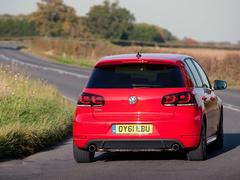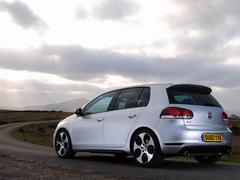VW Golf GTI (Mk6): PH Used Buying Guide
Thinking of buying a modern iteration of the definitive hot hatch? Read this first!

Whether you chose the six-speed manual or twin-clutch DSG, the Mk6 GTI needed 6.9 seconds to spring from rest to 62mph. Top speed was 149mph in the manual and 2mph less in the dual-clutch version, and the manual just had the edge on fuel economy and emissions.

You also have to pick between three- and five-door body styles, both of which are 23mm wider than the previous Mk5 model. There's no discernible difference in ride or handling between the pair, so it's all down to practicality. You could also pick the Cabriolet that was launched in 2012 with an electrically operated roof.
Volkswagen also offered the limited Edition 35 version with an uprated 235hp 2.0-litre motor. It hit 153mph and took 6.6 seconds from nought to 62mph. For some, it's the ultimate Mk6 GTI, but for most the added expense of buying one will be hard to justify against its modest gains in performance.

With more power, the GTI's XDS electronic traction aid that mimics a limited slip differential will get more of a workout in corners to keep the power from being wasted. You also have Adaptive Chassis Control that was an option when the car was new. It's worth having as the difference between Comfort and Sport is noticeable and tones the car to suit either setting.
High mileage early Golf GTI Mk6s can now be had from £7000, but £8500 is what you need to bag an average miles 2009 car with full service history. There's no need to pay more for the DSG gearbox, but five door GTIs command a small premium over three-door models.
Search for Volkswagen Golf GTIs (Mk6) here

Bodywork and interior

A creak from the rear of the cabin is most likely to be the rear upper bench not latching into position properly. A good shove usually solves this.
When opening the doors, listen for any sloshing water as it can gather in the bottoms and will eventually rot out the metal.
Paint finish was not always the best, but still check for misaligned panels or mismatched paint that points to crash repairs.
Electric folding door mirrors can sometimes stop working or work erratically.

Engine and transmission

2.0-litre TFSI engine needs its cambelt replaced at 80,000 miles or four years along with the water pump and tensioner pulley. This will be around £850 including labour at an independent specialist.
Coil packs fail but are cheap to replace.
Diverter valve fails and stops the engine from reaching peak turbo boost, so try a few cars to geta feel for any that might be low on performance. An uprated diaphragm for the diverter valve costs £30.

High pressure turbo line can break, which lets oil out in a fine spray and leads to turbo failure.
Stronger Sachs clutch costs £550 plus fitting and is recommended if you tune the engine.
Six-speed manual gearbox is reliable, but DSG transmission suffers from Mechatronic ECU failure that also afflicts the Mk5 GTI. Feel for any lurch as drive is taken up when you pull away from a standing start. A replacement Mechatronic ECU is £900 plus fitting, but ecutesting.com offers a rebuilt item with two-year warranty for £250.
DSG gearbox needs new oil and filter every 40,000 miles.
Air conditioning pump fails, so make sure it's blowing cold in the cabin.

Suspension and steering

Suspension can be within manufacturer tolerances but still cause uneven tyre wear. Also listen for a rumble from the rear tyres that indicates an alignment check and new bushes are needed.
Wheels, tyres and brakes
Uprated discs and pads for the front and rear from Tarox cost £525 for a complete set.
Corrosion on 18-inch Monza Shadow alloys
Search for Volkswagen Golf GTIs (Mk6) here
Search for Volkswagens here
SPECIFICATION - VW GOLF GTI MK6
Engine: 1,984cc 4-cyl turbo
Transmission: 6-speed man/DSG
Power (hp): 210@/5,300-6,200rpm
Torque (lb ft): 207@1,700-5,200rpm
MPG: 38.7/38.2
CO2: 170/173g/km
Price new: £22,415/£23,720
Price now: £7,000 upwards
Ours had the DCC which was an odd option to put on but seemed to work well - left it in comfort most of the time.
Ride is a lot better on the 17’s than 18’s.
The engine has a timing chain not a cambelt.
Better information here https://www.pistonheads.com/gassing/topic.asp?t=16...
EA888 engine (TSI) in the MK6 is completely different from the EA113 (TFSI) from the MK5. As someone above mentioned, cam chains were a problem on these engines but that issue seems to have been resolved on the newer 2013> TSI engines. I think carbon build up on the intakes was also a problem because of where the fuel was injected!?
Article is completely wrong different engine.
MK5 was a much better car overall with the exception of the MK6 edition 35 which is a very sweet engine in the MK6 package.
I would assume some time was spent researching the subject matter before writing an article.
"Can do better"
I hope the Mk7 is better, but I've never had cause or desire to try one. I ended up back in a Mk2 for a while - now that was much better!
Other things were the poor slow speed ride on 18" wheels even with switchable dampers and it was a pain reversing the car in the dark as the lenses were smoked as standard and therefore didn't light up enough to see where you were going.
I would recommend to anyone but the timing chain issues are not overblown.
Also, this article is horribly written. Simple basic research would enable you to get the 50% of the facts you got wrong, right.
Article is completely wrong different engine.
MK5 was a much better car overall with the exception of the MK6 edition 35 which is a very sweet engine in the MK6 package.
EA888 engine (TFSI) in the MK6 is completely different from the EA113 (TSI) from the MK5. As someone above mentioned, cam chains were a problem on these engines but that issue seems to have been resolved on the newer 2013> TSI engines. I think carbon build up on the intakes was also a problem because of where the fuel was injected!?
AFAIK there is no fixed service interval for the timing change.
Carbon build up does occur but doesn't generally cause anything like the same lack of power that it causes in, say, an RS4
Generally the engines are reliable, plenty of spare parts and pretty easy to work on.
Given the car shares it's underpinnings with the Mk5 Golf as well parts are cheap.
Overall they are good cars, personally I'd buy a high spec Mk5 ED30 and spend the change on maintenance and upgrades.
EA888 engine (TFSI) in the MK6 is completely different from the EA113 (TSI) from the MK5. As someone above mentioned, cam chains were a problem on these engines but that issue seems to have been resolved on the newer 2013> TSI engines. I think carbon build up on the intakes was also a problem because of where the fuel was injected!?
AFAIK there is no fixed service interval for the timing change.
Carbon build up does occur but doesn't generally cause anything like the same lack of power that it causes in, say, an RS4
Generally the engines are reliable, plenty of spare parts and pretty easy to work on.
Given the car shares it's underpinnings with the Mk5 Golf as well parts are cheap.
Overall they are good cars, personally I'd buy a high spec Mk5 ED30 and spend the change on maintenance and upgrades.
Especially the comment doors full of water and rusting. Was hoping for a 2012 model, but reading between the lines a 2013 on is better?
There is nothing wrong with them. By and large they are very reliable motors.
Many people on here don't like VAG products, so bad mouth them.
I'd buy a Mk5 purely because underneath it's the same as a Mk6, and everything can be retrofitted (Eg better dials, nicer steering wheel, radios etc).
Having sat in plenty of mk5, mk6 and mk7 golfs i do feel the mk6 interiors are the best.
Mk5, Mk6 are attractive, as like the other poster says you can easily retro fit OEM extras (I added DAB, Bluetooth, satnav easily and cheaply) as the parts are interchangeable across such a wide range of VAG cars.
Solid reliable cars in my experience.
Gassing Station | General Gassing | Top of Page | What's New | My Stuff










